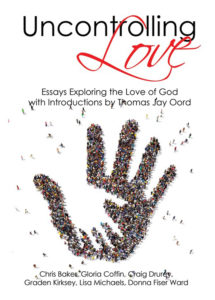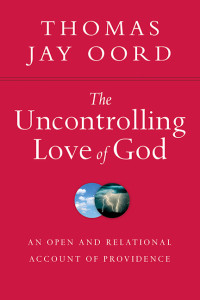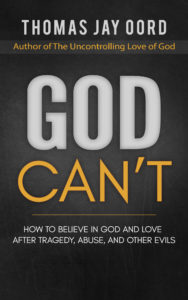Who God Is: Essential Kenosis
“Who is God?” Is there a question more difficult to answer? And is anyone more foolish than the one who thinks she can give a full and wholly accurate answer?
In this brief essay, I will tread where angels fear to tread: I talk about God’s nature.
I don’t pretend to offer a full or wholly accurate description, of course! I don’t claim to understand God completely or be certain these proposals are true.
I do think we have grounds to speculate about God’s nature. Sacred texts can help us. I think the revelation of God we find in Jesus is particularly illuminating. We can also draw wisdom from tradition, contemporary experiences, sages and saints, science and humanities, reason, and more.
Our vision of God will always be obscured. It’s as if we’re looking through distorted glasses. But we have reasons to think we can see something!
Uncontrolling Love
A few years ago, six friends edited a book of 80+ essays engaging ideas in my book, The Uncontrolling Love of God. These editors appropriately called this festschrift-style book, Uncontrolling Love. The 80 essayists wrote excellent pieces!
At the book’s outset, I offered a brief intro. I wanted to explain why I think uncontrolling love is the center of God’s nature.
In The Uncontrolling Love of God, I claimed love comes logically first in God’s nature. By ‘first,’ I don’t mean God’s attributes line up, like dominos, and love comes first in that line. By ‘comes logically first,’ I mean we should think about God’s other attributes in light of love.
Love comes first conceptually.
God has other attributes, of course. And they’re important. But I believe that when our understanding of God’s other attributes clash with love, we should reformulate them in ways that harmonize with love.
As I see it, our ideas about God should be oriented around the belief that Charles Wesley expresses in his hymn, when he writes, “thy nature and thy name is love.”[i]
God’s Love Shapes God’s Power
For instance, some theologians assume power or ‘sovereignty’ comes first in God. Consequently, they say God has the power not to love. To put it another way, they believe God’s sovereign will comes first, so they think God can choose not to love.
By contrast, I think love logically comes before power in God. This means I don’t think God can choose not to love. Because love comes in God’s nature logically before choice, God must love. God is free to choose how to love but not free to choose whether to love.
I’m not the first theologian to say love comes first in God’s nature, although we who say this seem to be in the minority. Nor am I the first to say God must love, although this statement may also strike some people as unusual.
I don’t know of anyone else, however, who adds the particular content I add to saying love comes first in God’s nature or that God must love. I call my view ‘essential kenosis.’ And it seems appropriate to talk about essential kenosis when discussing who God is.
Essential Kenosis
Taking Philippians 2:1-13 as my touchstone, I believe God’s love is necessarily self-giving and others-empowering. This means that God must self-give and others-empower, because it is God’s nature to do so. God’s loving gifts are “irrevocable,” to use the Apostle Paul’s language.[ii]
In fact, we can interpret the majority of the Bible well when essential kenosis is our hermeneutical lens.
Essential kenosis says God cannot override, withdraw, or fail to provide the power of freedom, agency, or existence to creation. Consequently, God cannot control creatures or creation.
That’s right; I’m saying God can’t control others, not just won’t control. To put it another way, God’s love is essentially uncontrolling. This idea is featured in the title of my book, God Can’t.
Not Voluntary Self-Limitation
Most kenosis theologians think God voluntarily chooses to self-give and others-empower. Most say God usually self-limits and decides to allow space to creatures to act freely. Jürgen Moltmann is a good representative of this view.
The problem with voluntary self-limitation is that it entails God could choose to un-self-limit at any time. In kenosis theologies like Moltmann’s, sovereign choice to self-limit comes first in God’s nature.
By contrast, essential kenosis says God is involuntarily self-limited. God is self-limited, in the sense that no outside force, power, or authority limits God. God’s loving nature shapes divine action such that God cannot control others. Because as the Apostle Paul would say, God “cannot deny himself,” I claim that God cannot control others.[iii]
Conclusion
Essential kenosis provides advantages that are great and wide-ranging. The advantage of essential kenosis I discuss most in The Uncontrolling Love of God is what it means for solving the central conundrum in the problem of evil.
The God who must love and cannot control others is not morally responsible for failing to prevent evil. The God of essential kenosis can’t prevent evil by acting alone. So God is not to blame.
This solution to the problem of evil is not just big for the scholarly community and theology nerds. It’s a big deal for everyday people who wonder why a loving and powerful God doesn’t prevent suffering. Again, that’s the message of God Can’t. According to essential kenosis, God doesn’t even ‘allow’ suffering, because God can’t stop it acting alone.
[i] Wesley, Charles, Come, Oh Thou Traveler Unknown (1742, reprint, The United Methodist Hymnal 1989), 386 (page citation is to reprint edition).
[ii] Rom. 11:29.
[iii] 2 Tim. 2:13




Comments
Nicely done, Tom! You have succinctly summarized the contextual heart of both The Uncontrolling Love of God and God Can’t in words that (mostly) I can say, and more to the point, I can understand. And the good news is that it’s very exciting and freeing and clarifying. I own both of the books, too, but today’s blog-read was fun!! Thanks.
Thanks for the kind response, Gord. I’m really happy you find these books helpful!
You’re singing to the choir–and I’m a tenor! Amen on all points (sung, of course). Well done!
I have purchased God Can’t, it is on my reading schedule! I am currently reading The Crucifixion of the Warroir God by Greg Boyd. I love what you put forth in essential kenosis. I have been troubled by the violence in the Old Testament for awhile and I am seeking possible answers. How does essential kenosis fit into such violence? I do not know. But, for 100% surety, God IS love so there has to be an answer.
Your work is a true blessing to me!
Thanks, Dan!
I enjoy singing with you, Vaughn!
This is such a refreshing summing up of God who IS Love. He can be no other! Love the book God Can’t. You are surely aware of Fr Richard Rohr and all his work undergirding your foundational premis? Contemplation is being restored across the world transforming us into Love and encouraging us, too, to be powerless!
Thanks for the kind note, Toby. I am aware of Richard’s good work. I see us working in the same direction!